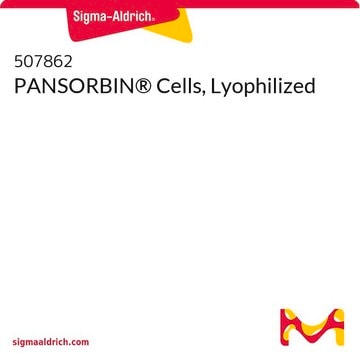507861
PANSORBIN® Cells, Standardized
Synonym(s):
Cell standard
Sign Into View Organizational & Contract Pricing
All Photos(1)
About This Item
UNSPSC Code:
41116133
NACRES:
NA.42
Recommended Products
form
liquid
Quality Level
contains
0.1% sodium azide as preservative
manufacturer/tradename
Calbiochem®
storage condition
do not freeze
capacity
≥2 mg/mL binding capacity
shipped in
ambient
storage temp.
2-8°C
General description
Heat-killed, formalin-fixed Staphylococcus aureus cells (Cowan I strain) that bear a high cell-surface density of protein A and have been pickled by the method of Kessler. Useful as a solid-phase IgG-binding reagent due to the high-affinity interaction of protein A with the Fc domain of IgG. PANSORBIN cells work best when the antibody is human (IgG1, IgG2, IgG4), rabbit IgG (all isotypes), or mouse (IgG2a, IgG2b, IgG3).
PANSORBIN Cells are heat-killed, formalin fixed Staphylococcus aureus cells that have a coat of protein A and have been pickled by the method of Kessler. Useful for mitogenic stimulation of B lymphocytes and for immunoprecipitation.
Application
Most common applications include immunoprecipitation and mitogenic stimulation of B lymphocytes.
Warning
Toxicity: Standard Handling (A)
Physical form
Supplied as a ≥10% (w/v) Staphylococcus aureus cell suspension in PBS, 0.1% sodium azide, pH 7.2.
Other Notes
Kierszenbaum, F., et al. 1991. Immunology74, 317.
Meikle, P.J., et al. 1991. J. Biol. Chem.266, 22569.
Ezaki, O., et al. 1989. Biochem. Biophys. Res. Commun. 159, 1368.
Murakami, H., et al. 1988. Biochem. J.256, 917.
Kessler, S.W. 1975. J. Immunol. 115, 1617.
Meikle, P.J., et al. 1991. J. Biol. Chem.266, 22569.
Ezaki, O., et al. 1989. Biochem. Biophys. Res. Commun. 159, 1368.
Murakami, H., et al. 1988. Biochem. J.256, 917.
Kessler, S.W. 1975. J. Immunol. 115, 1617.
Legal Information
CALBIOCHEM is a registered trademark of Merck KGaA, Darmstadt, Germany
PANSORBIN is a registered trademark of Merck KGaA, Darmstadt, Germany
Signal Word
Warning
Hazard Statements
Precautionary Statements
Hazard Classifications
Acute Tox. 4 Oral
Storage Class Code
12 - Non Combustible Liquids
WGK
WGK 3
Flash Point(F)
Not applicable
Flash Point(C)
Not applicable
Certificates of Analysis (COA)
Search for Certificates of Analysis (COA) by entering the products Lot/Batch Number. Lot and Batch Numbers can be found on a product’s label following the words ‘Lot’ or ‘Batch’.
Already Own This Product?
Find documentation for the products that you have recently purchased in the Document Library.
Menaka D Hapugoda et al.
Clinical and vaccine immunology : CVI, 14(11), 1505-1514 (2007-09-28)
The resurgence of dengue (DEN) virus infections in the last few decades coupled with the lack of a preventive vaccine and specific antiviral drugs has jointly contributed to making this a significant global public health problem. Currently, symptomatic supportive treatment
Use of recombinant vaccinia virus vectors for cell biology.
O A Weisz et al.
Methods in cell biology, 43 Pt A, 137-159 (1994-01-01)
S Ebner et al.
Journal of immunology (Baltimore, Md. : 1950), 166(1), 633-641 (2000-12-21)
Dendritic cells produce IL-12 both in response to microbial stimuli and to T cells, and can thus skew T cell reactivity toward a Th1 pattern. We investigated the capacity of dendritic cells to elaborate IL-12 with special regard to their
Peifang Sun et al.
Methods in molecular biology (Clifton, N.J.), 1808, 187-196 (2018-06-30)
Dengue envelope (E) protein is a dominant antigen for vaccine development and E-based vaccines have shown partial or full protection against live-virus challenge in non-human primates. Generally, T cell responses can be investigated with peptides. However, hundreds of over-lapping peptides
K E Reed et al.
Methods in molecular medicine, 19, 331-342 (1999-01-01)
Heterologous expression systems have been widely used to study hepatitis C virus (HCV) proteins in lieu of an efficient method for establishing HCV infections in cell culture. Studies of HCV polyprotein processing in both mammalian-cell-based and cell-free expression systems have
Our team of scientists has experience in all areas of research including Life Science, Material Science, Chemical Synthesis, Chromatography, Analytical and many others.
Contact Technical Service








